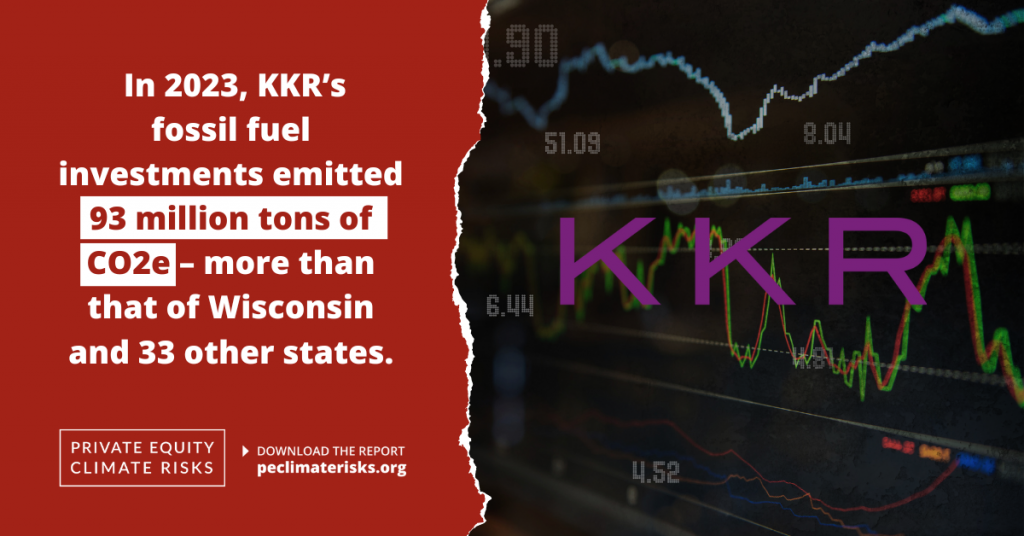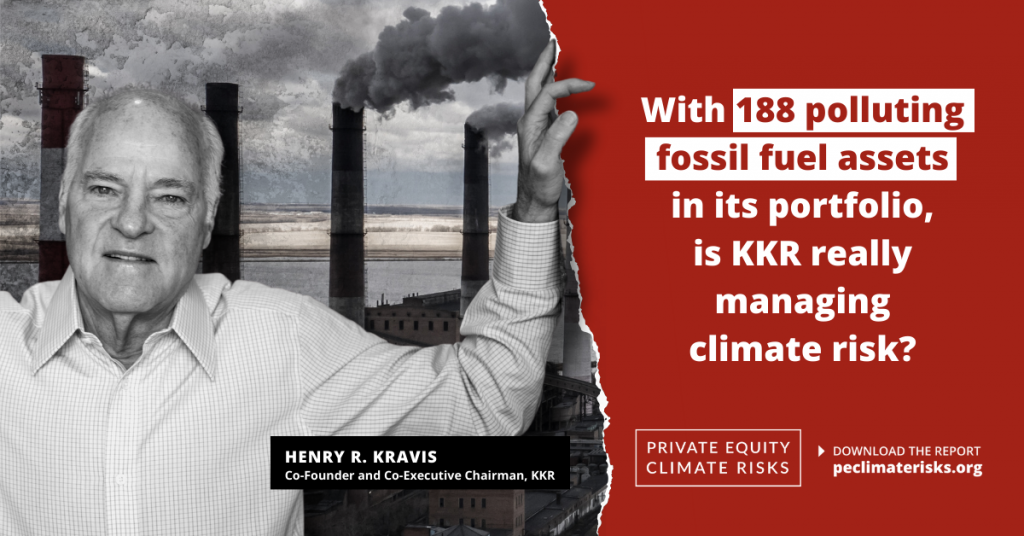April 2024 REPORT
93 Million: The Carbon Emissions KKR Didn’t Disclose
NEW REPORT
Press Release Report Data
With investment in nearly 200 fossil fuel assets emitting roughly 93 million metric tons of greenhouse gasses annually, KKR’s emissions are 6,500 times higher than disclosed.
Buyout giant Kohlberg Kravis Roberts & Co. (KKR) wields over $553 billion in assets under management, positioning itself as a global financial behemoth hugely invested in the energy sector. A new report by the Private Equity Risks Consortium, 93 Million: The Carbon Emissions KKR Didn’t Disclose, finds substantial investments in the fossil fuel sector, suggesting a significant misalignment between KKR’s public commitments on managing climate risk and its investment actions.
Fact: KKR’s 2022 environmental ranking was a failing ‘D’ grade. VIEW THE SCORECARD HERE.
KKR’s fossil fuel portfolio includes 188 assets across 21 countries, spread across the firm’s ownership of 17 fossil fuel-based portfolio companies resulting in a staggering 93 million metric tons of CO2 equivalent (CO2e) emissions in 2023 alone. This figure contrasts sharply with the paltry 14,342 metric tons CO2e KKR reported in its 2022 Sustainability Report, underlining a profound transparency deficit. Such discrepancies introduce substantial financial risks, including a shifting regulatory environment and investor pushback.

KKR KEY STATS
-
Assets Managed: $553 billion
-
Fossil Fuel Investments: 188 assets across 21 countries
-
2023 Emissions: 93 million metric tons (mt) of C02e
-
Emissions from Coal Power Generators: Over 5.6 million mt of C02e
KKR’s investments include Crescent Energy, Sempra, and six “carbon bomb”-linked projects through their involvement in or connections to the Barnett/Permian/Eagle Ford basins (U.S.), Duvernay/Montney basins (Canada), and Maritsa coal mine (Bulgaria).
Download KKR’s current assets and view our Private Equity Energy Tracker.
Nearly half its emissions originated from its upstream operations, including 10 oil and gas fields in the United States and Canada, including in California’s highly populated Los Angeles and Orange counties as well as operations in New Mexico found to have flared polluting and dangerous compounds.
Ongoing investments in problematic LNG projects like the Cameron LNG, Energia Costa Azul, and Port Arthur terminals also underscore the potential for stranded assets as the world shifts to cleaner energy sources.
While KKR publicly champions climate action, its continued investment in fossil fuels contradicts these pledges, raising questions about the firm’s commitment to a sustainable future. Although KKR backs approximately 12.3 GW of renewable energy capacity, these investments do not offset the greenhouse gas emissions from its fossil fuel portfolio, highlighting the need for a strategic pivot to truly sustainable investments.
Check out our 2022 Private Equity Scorecard and our report on KKR’s environmental record.
KKR’s active investment in a number of fossil fuel projects with demonstrated records of community harm, such as the Colonial Pipeline and the Coastal GasLink Pipeline, has come under recent scrutiny. In April, the Chicago Teachers pension board voted down new investment in the private equity firm citing its poor track record on climate and environmental justice.
KKR is not the only private equity firm with major ongoing investments in oil and gas. Since 2010, at least $1.1 trillion has been channeled into oil and gas exploration, extraction, pipelines, and power plants worldwide.
Impact on Investors
Future Financial Stability:
KKR’s investments in fossil fuel-related projects appear at odds with long-term financial stability and profitability. As the global momentum shifts towards reducing carbon emissions and embracing renewable energy, investments in pipelines and LNG facilities with long payback periods might not yield the expected return. This poses risks for institutional investors, especially pension funds, that rely on consistent returns.
Reputational Risks:
Investing in companies alleged to have disregarded Indigenous rights, and with histories of negative environmental impacts and health consequences, can tarnish an investor’s reputation. Investors are increasingly concerned about these risks in addition to conventional financial metrics.
Trust and Transparency Concerns:
KKR’s environmental track record and limited disclosures can erode trust. Eighty-seven percent of investors believe there’s some degree of greenwashing in corporate reporting. For institutional investors seeking transparency, this presents a significant barrier to investing with confidence.
Regulatory and Policy Risks:
Policymakers globally are emphasizing environmental compliance and the energy transition. Firms not aligning with these mandates risk legal implications, fines, and sanctions.

KKR’s Claims Don’t Hold Up
While KKR highlights a handful of renewable energy projects and declares a commitment to “environmental stewardship” their predominant energy investment strategy is still tied to oil and gas. KKR received a ‘D’ grade on the PECR consortium scorecard assessing and ranking major private equity players on their fossil fuel portfolios and progress toward energy transition.
Private Equity & Accountability
Private equity’s structure allows for-profit extraction without long-term accountability, and community and environmental consequences are often overlooked. This approach places the planet and the communities where these projects are located at great risk.
KKR’s Troubling Legacy
KKR’s investment in fossil fuel projects contradicts claims of environmental consciousness. Moreover, KKR’s affiliation with an organization opposing climate action – the State Financial Officers Foundation, adds further doubts to its “responsible” image.
It’s Time for True Accountability
The environmental and social repercussions of KKR’s investments can no longer be ignored. The need for true transparency, responsibility, and accountability in the private equity industry is evident. As one of the leading players, KKR should lead the charge by remedying past harms and genuinely committing to a sustainable future, by taking the following actions:
- Science-Based Targets:
Align with clear, evidence-backed climate goals. Cease any new fossil fuel investments and increase renewable energy holdings.
- Full Disclosure:
Offer comprehensive reporting on environmental violations, ongoing litigation, community impacts, and detailed emissions data. Such transparency supports investors of genuine ESG commitment.
- Clear Transition Plan:
Disclose a robust climate transition roadmap. By showcasing a strategic shift towards a greener portfolio, KKR can offer investors a vision of long-term stability.
- Respect for Indigenous and Land Rights:
Ensure all investments respect human rights, just transition, land rights, and Indigenous rights. Such commitments underscore responsible investing and reduce potential legal and reputational risks.
- Political Spending Transparency:
Detail all political spending and lobbying efforts. Align with global standards on responsible corporate climate lobbying, ensure the firm’s actions match its public climate rhetoric.
Americans for Financial Reform Education Fund and Global Energy Monitor are solely responsible for this content.
About Americans for Financial Reform Education Fund
Americans for Financial Reform Education Fund (AFREF) is a coalition of more than 200 civil rights, community-based, consumer, labor, business, investor, faith-based and civic groups, along with individual experts. Follow AFREF at ourfinancialsecurity.org and on Twitter @RealBankReform.
About Global Energy Monitor
Global Energy Monitor (GEM) develops and shares information in support of the worldwide movement for clean energy, seeking to build an open guide to the world’s energy system. Users of GEM’s data and reports include the International Energy Agency, United Nations Environment Programme, the World Bank, and the Bloomberg Global Coal Countdown. Follow GEM at globalenergymonitor.org and on Twitter @GlobalEnergyMon.





